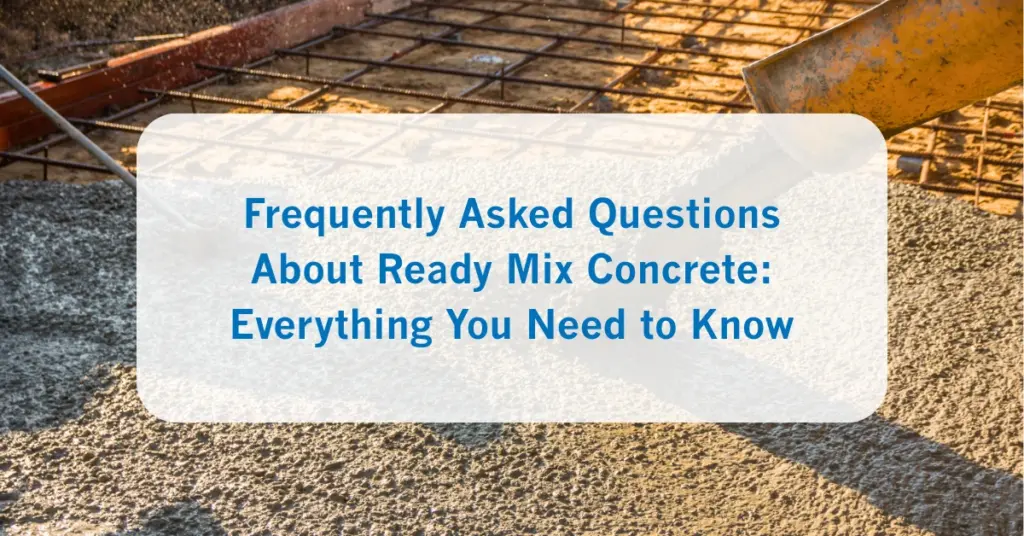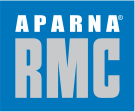Frequently Asked Questions About Ready Mix Concrete: Everything You Need to Know

September 26, 2025
1. Introduction
Whether you’re building a small house or a large infrastructure project, one question always comes up: “Which concrete should I use?” For most modern projects, the answer is Ready Mix Concrete (RMC).
RMC has revolutionized construction by offering consistent quality, faster delivery, and reduced onsite labor. But with so many questions surrounding its cost, durability, and applications, it’s important to clear the confusion.
This blog addresses the most Frequently Asked Questions (FAQs) about Ready Mix Concrete — giving you clear answers to make informed construction decisions.
2. Why the Right RMC Supplier Matters
Concrete isn’t just another building material; it determines the strength, safety, and longevity of your project. Choosing the wrong supplier can lead to:
- Project delays due to late delivery.
- Higher costs from rework caused by poor quality mixes.
- Durability issues if proper mix design is not followed.
3. Key Factors to Consider When Choosing a Ready Mix Concrete Supplier
a. Proximity and Delivery Capabilities
RMC must be delivered within a set timeframe. Suppliers with multiple plants near your site ensure timely delivery.
b. Product Quality and Certifications
Always confirm that the supplier follows ISO, BIS, and QA/QC standards. This ensures mixes are durable and compliant with safety norms.
c. Range of Concrete Mixes Offered
From M20 for homes to M80 for infrastructure, a reliable supplier should offer a wide range, including specialty concretes like self-compacting or fiber-reinforced mixes.
d. Reputation and Experience
Suppliers with experience in large projects like airports, metros, and IT parks are better equipped to deliver consistent quality.
e. Customer Service and Technical Support
Top suppliers provide onsite technical advice to help with curing, placement, and handling of RMC.
f. Pricing and Transparency
Transparent rate cards, no hidden charges, and clear delivery terms build trust.
4. Checklist Questions to Ask Suppliers
- What grades of RMC do you supply?
- How close is your batching plant to my project site?
- Do you provide specialized concrete like SCC or green concrete?
- What certifications back your mixes?
- Can you share references of projects supplied recently?
5. How Aparna RMC Sets the Standard
Aparna Ready Mix Concrete is one of India’s most trusted names, with 36+ plants and 300+ mixers across multiple states.
- Quality Assurance: SCADA-based batching ensures accuracy in every mix.
- Wide Range: Supplies from M20 to M80, along with specialized concretes such as SwiftFlowMix (SCC), AstraGlowCrete (Green Concrete), EchelonCrete (Lightweight Concrete), and Fiber-Reinforced Concrete.
- Proven Track Record: Supplied to Hyderabad Metro, Rajiv Gandhi International Airport, major IT parks, and residential projects.
- Sustainability: Promotes eco-friendly practices by using M-sand and GGBS.
6. Conclusion
RMC has become the backbone of modern construction thanks to its reliability and efficiency. By choosing the right supplier, you ensure your project is on time, within budget, and built to last.
👉 Use the checklist shared above and always evaluate suppliers carefully before making a decision.
7. FAQs
Q1: What is Ready Mix Concrete (RMC)?
RMC is concrete that is manufactured in a batching plant under controlled conditions and delivered to construction sites in transit mixers.
Q2: Is RMC better than site-mixed concrete?
Yes. RMC offers consistent quality, saves time, reduces wastage, and ensures stronger structures compared to manual site mixing.
Q3: How much does Ready Mix Concrete cost?
Costs vary depending on grade, location, and supplier. Premium suppliers like Aparna RMC ensure transparent pricing with no hidden charges.Still have questions about Ready Mix Concrete?
👉 Contact Aparna RMC
